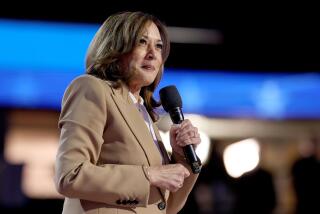Bush Loads $104 Million in Ammo for Ad War
- Share via
WASHINGTON — President Bush’s reelection campaign reported Friday that it had raised a record $143.5 million through Jan. 31 and had $104.4 million in the bank, a war chest it will tap heavily shortly after Democrats settle on a nominee.
Bush’s campaign also announced it had attracted 50,000 new contributors as it raised $12.8 million in January. The president is on track to reach his goal of $170 million in total contributions by April, if not earlier.
But for anxious Republicans looking toward November, the numbers that matter at the moment are Bush’s poll ratings. Some recent national surveys have shown him trailing the two remaining major contenders for the Democratic presidential nod, Sens. John F. Kerry of Massachusetts and John Edwards of North Carolina.
And while the effectiveness of Bush’s money machine continues to impress political professionals, the flameout of former Vermont Gov. Howard Dean’s presidential candidacy was a reminder that fundraising success does not necessarily translate into votes. Dean raised $50 million, far more than any of his rivals in the Democratic race, but failed to win a single primary or caucus before he suspended his campaign this week following a third-place finish in Tuesday’s Wisconsin primary.
Dean had raised $47.6 million by the end of January, records show, and had nearly $5 million on hand at that point.
Edwards on Friday filed a report showing he had received $2 million in individual contributions and $3.4 million in federal matching funds in January.
For the entire campaign, he had received $22.5 million, including $5.1 million in federal funds. But he had just $500,000 in cash on hand at the end of the month. His campaign has said his fundraising has picked up after a strong second-place showing in Wisconsin’s primary.
Figures were not available for Kerry as of late Friday.
Bush’s fundraising for his reelection broke the Republican record he had set in the 2000 campaign, when he collected slightly more than $100 million in donations. But many within the GOP are wondering when his campaign will stop raising money and start spending it.
So far, the only public responses from Bush, Vice President Dick Cheney and their political team to months of relentless criticism from Democratic hopefuls have come through news releases, sporadic speeches, media interviews and the Internet.
The Bush-Cheney campaign shed little light Friday on when it planned to take the next step: radio and television advertising.
“Stay tuned,” said campaign spokesman Scott Stanzel. “We have indicated that there would come a time when this would be a two-person race. We are rapidly approaching that time.”
Judging from their increasingly fierce Internet assault on Kerry and his record, the Republicans clearly view him as Bush’s likely opponent. The stepped-up GOP attacks have sought to depict Kerry as a hypocrite when he portrays himself as an opponent of special interests. The Republicans have trumpeted news accounts about the senator’s long record of raising money from lobbyists and others with business in Washington.
But some analysts on Friday questioned whether the Bush camp could maintain that argument, given the president’s fundraising sources.
“You have huge amounts of money flowing to him from the financial services industry and the real estate and development interests all across the country,” said Dwight L. Morris, a Virginia-based campaign finance analyst. “If you have nearly $105 million in the bank, you can’t be throwing stones about special interests.”
According to Morris’ analysis of the campaign data, the Bush campaign has benefited the most from donors tied to PricewaterhouseCoopers LLP ($409,000), Merrill Lynch and Co. ($396,000) and UBS Financial Services ($283,000).
Bush has received at least $50,000 apiece from 69 businesses through their executives and employees, Morris calculated.
The Bush-Cheney campaign signaled that its first broadcast ads would take the high road.
“The Democrats have engaged in a campaign of negative attacks for months,” Stanzel said. “When the president begins his campaign, he will talk about his positive, forward-looking vision for America. The campaign will focus on his steady leadership in tough and dangerous times.”
But political analysts said they thought the Bush team should move swiftly to erase doubts about his job performance planted by Democrats.
Recent comments by his economic advisors that the “outsourcing” of U.S. jobs overseas could be a plus for the economy and that making hamburgers at a fast-food restaurant might be counted as a manufacturing job have provided grist for critics.
Bush “is now in a position where the campaign will not be operating out of the position of strength it had planned,” said Anthony J. Corrado, a professor at Colby College in Maine who is an expert on political fundraising. “They’re going to now have to spend more resources shoring up the president’s image.”
Corrado said that despite Bush’s broad base of contributors, including many who gave less than $200, his economic record would prove far more important to his reelection hopes.
“One would have hoped he would have created as many jobs as donors,” Corrado said, referring to the net loss of jobs since Bush took office.
More to Read
Get the L.A. Times Politics newsletter
Deeply reported insights into legislation, politics and policy from Sacramento, Washington and beyond. In your inbox twice per week.
You may occasionally receive promotional content from the Los Angeles Times.










